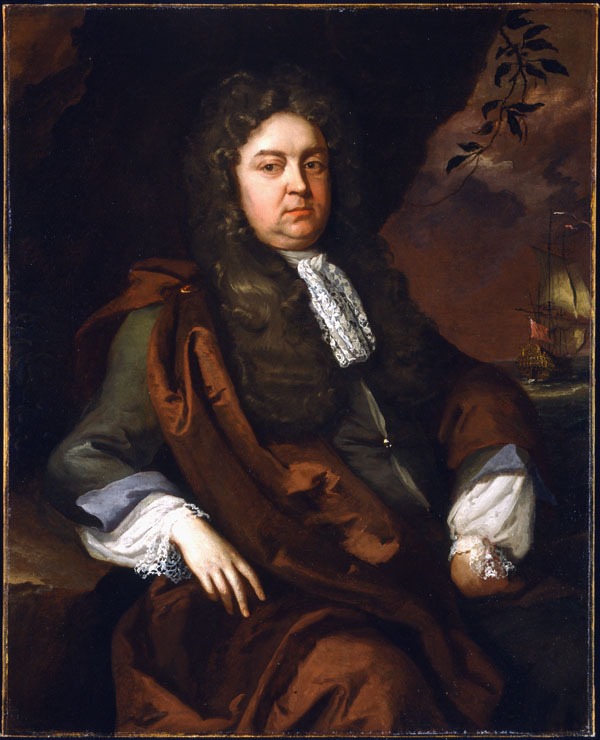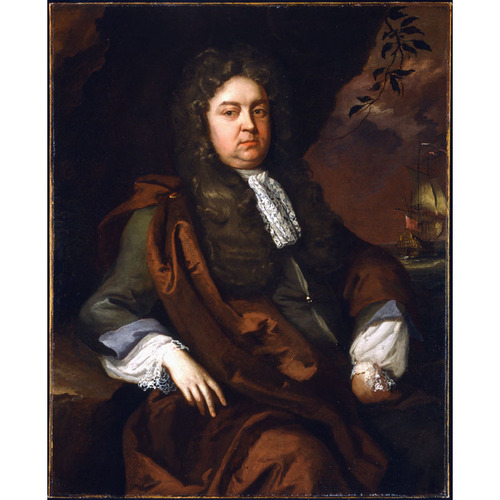
Source: Courtesy of Wikimedia Commons
BERRY, Sir JOHN, rear-admiral and captain of the Newfoundland convoy; b. 1635 in North Devon; d. 14 Feb. 1689/90 at Portsmouth; buried in Stepney Church.
John Berry was the second son of the vicar of Knoweston, near Ilfracombe, of a family long established and influential in the area. The Civil War, however, saw the family fortune committed to the Royalist cause and on his father’s death in 1652 John and his elder brother went to sea. In 1663 Berry joined the Royal Navy as a boatswain but outstanding service in action gained him his first command on 17 Sept. 1665. After further commands, in the Mediterranean and the Caribbean particularly, he came to the notice of the Duke of York while in action with the Resolution in the Battle of Southwold Bay (1672). He was knighted immediately afterwards and the favour he found with the Duke of York was a prominent factor in his personal advancement in later years. In 1682 Berry commanded the Gloucester, carrying the duke to Scotland, and survived the court-martial which followed when the ship ran aground in the Humber. In 1683 he reached flag-rank and was second-in-command to Lord Dartmouth in the raid on Tangier. From 1684 he served as one of the navy commissioners and in 1688, after the defection of Lord Dartmouth, he commanded the naval forces deployed against William of Orange when he moved against James II.
In 1675 this prominent sailor was captain of the annual Newfoundland convoy. At this time it seemed certain that the long dispute between the Bristol Society of Merchant Venturers and opposing interests among the London merchants and the settlers in Newfoundland had been finally resolved in favour of the West Country men. The decision of the Committee for Trade and Plantations not only re-affirmed that of March 1670 but gave way to the strongest claims of the western adventurers and ordered that the permanent settlers should remove themselves to other colonies in America or be forcibly removed to England. As captain of the annual convoy, Berry was the representative of royal authority in the island and it was his duty to inform the settlers of the council’s decision.
Berry was soon convinced that most of the charges made against the colonists were unjust. His reports of July and September 1675 (PRO, CSP, Col., 1675–76, 275–77), provided the first organized inquiry and subsequent annual reports followed the lines which he had laid down. He did his best to present the planters’ case in the most favourable possible light and his views found immediate confirmation in a separate report from a Mr Page. Early in 1676 John Downing came to England to protest against the actions of the fishermen in that year and another independent report in favour of the planters came from the commander of the 1676 convoy, Capt. Russell. In 1677 a survey made by Capt. Poole estimated that there were 523 colonists scattered about 28 tiny settlements, mainly on the east coast.
The combined weight of these appeals brought the temporary suspension of the charter regulations of 27 Jan. 1675/76 and a commission was formed to investigate the situation yet again. No change was made in the government – or lack of government – pending the final judgement of this commission, although the English government continued to send out annually convoy captains with lists of heads of inquiry on which they reported after their return. But after 1680 the commission hardly functioned and no such judgement was ever achieved. Petitions for the governorship continued to be presented by such people as Capt. Robinson*, William Hinton, and Mr Coney but the final outcome of all the disputes since 1670 was inconclusive.
Among those who were responsible for the preservation of a permanent settlement in Newfoundland at this time Berry is perhaps the most important. Unlike the leaders of the planters’ cause with which he identified himself, he had no direct interest in the colony and had no aspirations to the governorship. He entered the dispute at a crucial time and, while he achieved this by no means single-handed, he was instrumental in ending the West Country monopoly in Newfoundland and in the eventual reversal of British policy. Berry was appointed a commissioner for Virginia in 1677, presumably in recognition of his Newfoundland achievements (PRO, CSP, Col., 1677–80).
[See also Hinton and Downing.]
PRO, Acts of P. C., col. ser., 1613–80, 1680–1720, Unboundpapers; CSP, Col., 1669–74, 1675–76, 1677–80, 1681–85; CSP, Dom., 1665–66, 1672–73, 1673, 1680, 1683, 1684–85. Several secondary works dealing with Berry’s part in the determination of the dispute include: DNB. Innis, Cod fisheries. C. B. Judah, The North American fisheries and British policy to 1713 (University of Illinois Studies in the Social Sciences, XVIII, nos. 3–4, 1933). Lounsbury, British fishery at Nfld. Prowse, History of Nfld. Rogers, Newfoundland.
Cite This Article
C. M. Rowe, “BERRY, Sir JOHN,” in Dictionary of Canadian Biography, vol. 1, University of Toronto/Université Laval, 2003–, accessed December 12, 2025, https://www.biographi.ca/en/bio/berry_john_1E.html.
The citation above shows the format for footnotes and endnotes according to the Chicago manual of style (16th edition). Information to be used in other citation formats:
| Permalink: | https://www.biographi.ca/en/bio/berry_john_1E.html |
| Author of Article: | C. M. Rowe |
| Title of Article: | BERRY, Sir JOHN |
| Publication Name: | Dictionary of Canadian Biography, vol. 1 |
| Publisher: | University of Toronto/Université Laval |
| Year of publication: | 1966 |
| Year of revision: | 1979 |
| Access Date: | December 12, 2025 |



